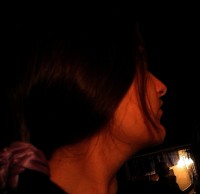A couple of years ago, when I was in my third year of uni, I was crippled by anxiety and depression.
I was terrified of everything, even descending the stairs to leave my flat. I actually sat crying at the top of them, shaking and gasping and clinging to the banister, certain I would slip and break my neck if I stood up. Totally alone.
I started sweating whenever someone talked to me, avoiding eye contact, convinced I wasn’t worthy.
 My heart was perpetually agitated. I couldn’t sleep and when I did I had such nightmares that I woke up with my heart racing, feeling like I hadn’t had any rest at all.
My heart was perpetually agitated. I couldn’t sleep and when I did I had such nightmares that I woke up with my heart racing, feeling like I hadn’t had any rest at all.
Things that I used to enjoy – acting chief among them – now made me miserable. It wasn’t fair. Throughout high school acting had been my escape from the misery, not just experiencing someone else’s emotions, but the adrenaline of performing. Now there was no refuge left.
All I could do was wrap myself up in my duvet in front of my laptop and watch endless episodes of some TV series or other in an effort to distract my brain from berating me, if only for a while.
Eventually, sick and tired of being relentlessly miserable, I gathered what little courage I had left and went to the university health centre. The doctor immediately prescribed anti-depressants and sleeping pills and referred me to a counsellor.
It was hard opening up to the counsellor – I don’t like “bothering” other people with my troubles – but she pieced together my problems, deducing that they probably arose from the awful bullying I’d received between the ages of ten and fifteen, and the fact that I didn’t feel I belonged anywhere.
She went on to say that it was very common for the children of immigrant families to experience what I experienced. Immigrant children are often bullied when they first arrive in their new country, bullied for being different – perhaps their accent or way of dressing – and for reasons that have nothing to do with inherent xenophobia and everything to do with ten-to-fifteen-year-olds being nasty, peer-motivated adolescents who like to put each other down.
I sometimes wonder if I was bullied because some New Zealanders still see English people as rich, imperialistic, “you ignorant colonials belong to us” royalists, but, despite the fact that when I first arrived my classmates assumed I had a butler and drank tea with the Queen, I never really got that impression. As for the feeling that I don’t belong… well it goes deeper than your typical young person angst. Deeper than not having many friends.
The fact is I have lived in New Zealand for over half my life and I still don’t feel like a New Zealander. Maybe this is because, not having many friends, I spent more time than the average teenager with my parents, watching DVDs of British comedy series. I have not lost my English accent, and of all the qualities that the New Zealand media proudly boasts are Kiwi – such as the do-it-yourself attitude, the love of rugby, the hatred of Australians, and general toughness – I have none.
I am English. I glory in our history, our countryside, our multitude of hilarious accents and our sense of humour! But that’s just it – do I have the right to say ‘our’ anymore? I’m not up with the current trends in England. I’ve set foot there once in the last twelve years. English people think my accent sounds slightly Australian.
When I was talking to some English people I was friends with at primary school, I mentioned going to the dairy to get some milk. From that, they thought that in order to get milk New Zealanders walked down the road to a dairy farm and got it directly from a cow. I had to explain that in New Zealand a dairy is a corner shop, or convenience store. I had said dairy automatically.
I’m not really English anymore, but I’m not a New Zealander either, and that sense of not belonging anywhere is really depressing. In fact it can shake you to the core.
Not to sound overly dramatic, but when my parents decided to emigrate, they destroyed my life.
All my friends, my hobbies, my other relatives, my culture – the only place in my life I would ever fit in because I was born to fit in there – it was all ripped away from me.
I don’t know if I can describe the total loneliness I felt without sounding whiny, but, according to that counsellor, it was the sort of loneliness that can fester and manifest itself years later as clinical depression.
To be fair, my parents must have felt lonely too. We all clung desperately to our Englishness, be it with BBC DVDs or watching the football in the middle of the night. I remember when the English comedian Bill Bailey came to Auckland with his Tinselworm stand-up show: he asked the audience whether they’d heard of ASDA, (a massive supermarket chain that doesn’t exist in New Zealand,) and every expat Brit in the audience, including us, cheered, to which he responded, “You’ve been away too long.” We should not have been cheering for ASDA. Even if it does sell such a variety of food that we can only dream of in New Zealand…
So desperate were we for a little piece of home that when we were travelling around the South Island in a campervan, for example, and we came across a sign for a place called Sheffield, we pulled over excitedly, clamouring for a photo.
(In England, the town we lived in was quite close to Sheffield, but, unlike Sheffield, it does not have anywhere else in the world named after it. Either nobody ever left before us, or they were so glad to leave it behind that they never wanted to be reminded of it. Either way, extremely sad.)
So there you have it: my personal existential crisis, and the crisis of all immigrant kids. I wonder how many children of immigrant families actually develop depression as a result, but at the end of the day I’m still glad we moved to New Zealand.
You might be happy to know that in the last few weeks I’ve managed to wean myself off the anti-depressants and only occasionally start sweating when someone talks to me. Or you might not care. But I’ve learned that you shouldn’t be ashamed of taking anti-depressants – they work, and it’s better than being miserable all the time.
UPDATE: It’s been two years since I wrote this. Recently, I’ve written a more detailed account of what it’s actually like living with depression and anxiety. You can find it on the The Writers’ Labyrinth.

